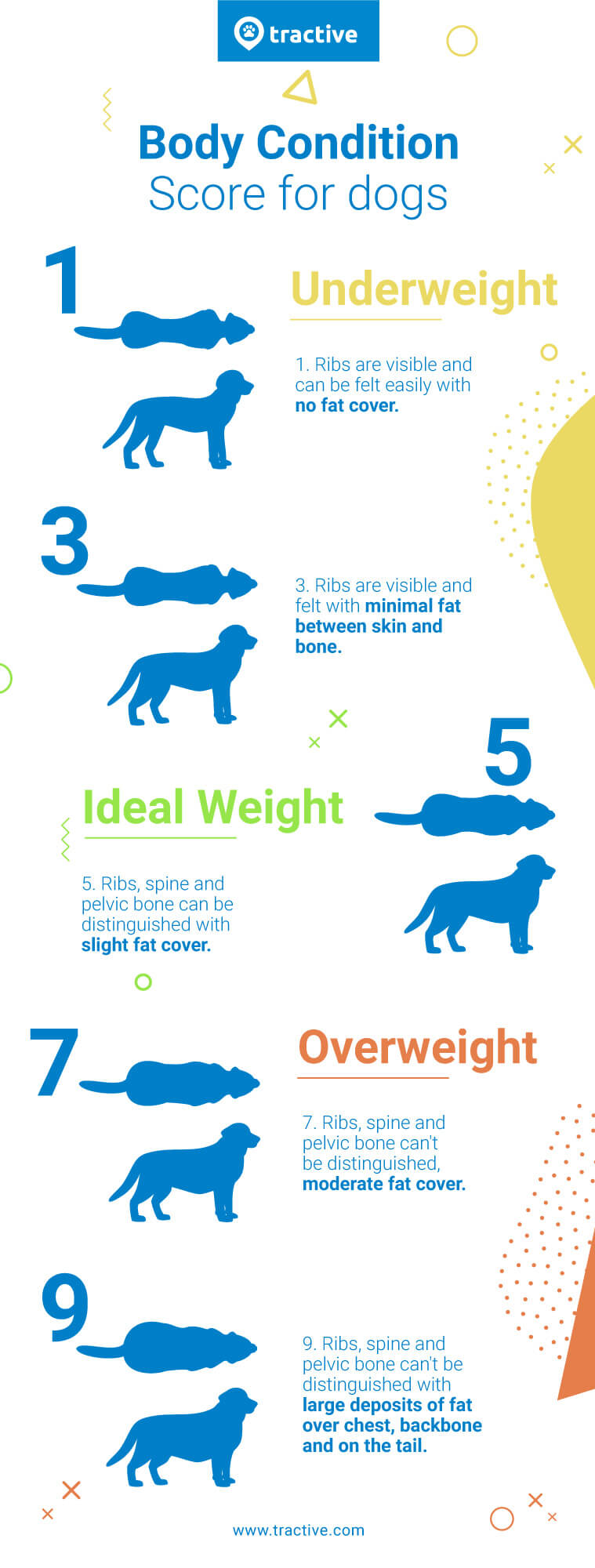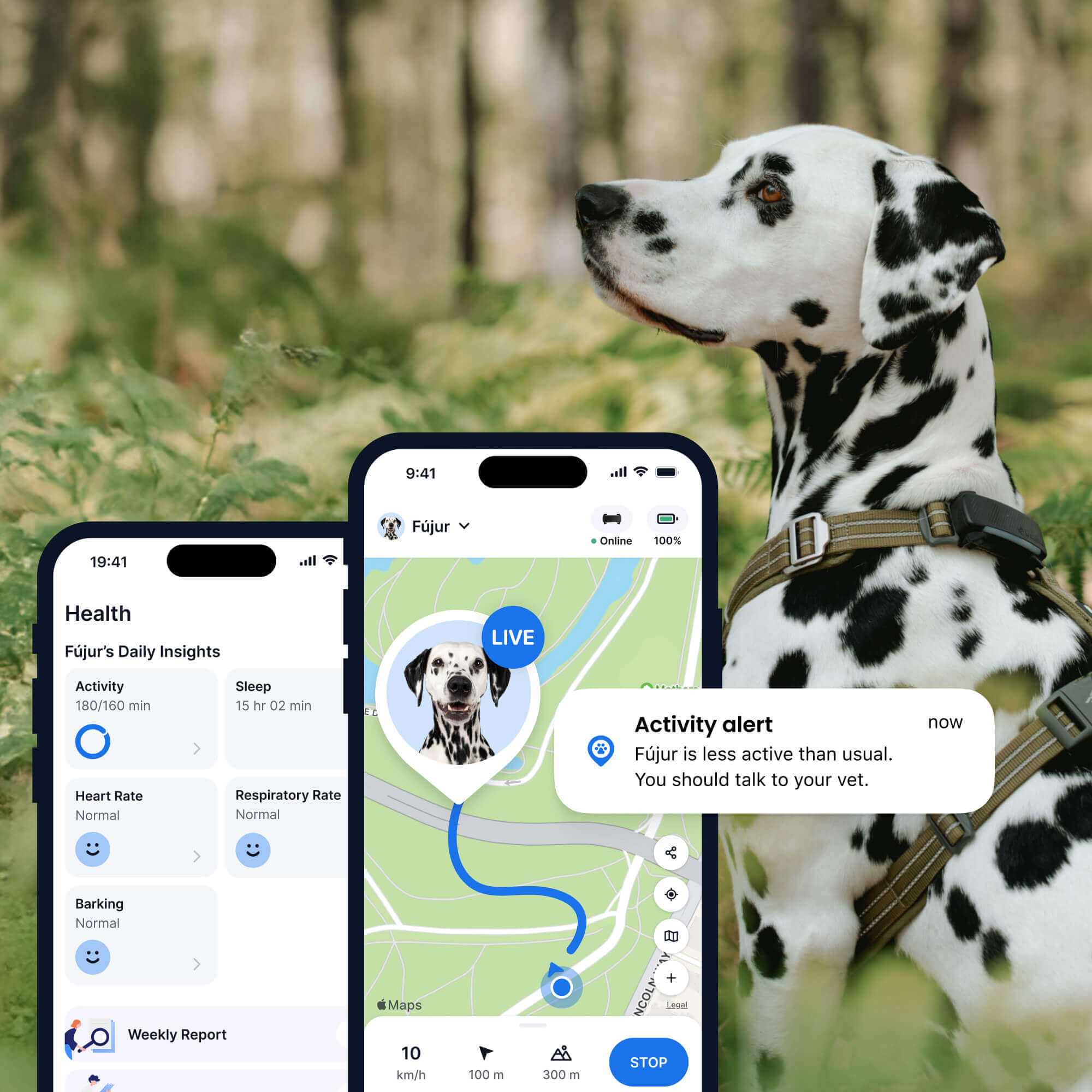 Approved by Dr. Dwight Alleyne, DVM
Approved by Dr. Dwight Alleyne, DVM Dog Losing Weight: 10 Reasons & Catching It Early
Even if they're on the trimmer side, it can be pretty alarming dealing with a dog losing weight - seemingly out of nowhere! Here are the reasons why - including less serious ones, like a diet change, to more concerning health issues. (Including cancer.)

Even if your furry buddy’s a bit on the trimmer side, it can be pretty alarming dealing with a dog losing weight seemingly out of nowhere. So we’re going to cover all the reasons underlying weight loss in dogs – and how you can catch on to the subtle changes in behavior (like how active they are) that signal your dog might not be feeling their best.
Key Takeaways
Weight loss in dogs can have various causes.
A dog losing weight could be due to a simple change in diet or increased activity. However, it can also be a sign of a more serious medical condition like a digestive disorder, heart disease, or Addison’s disease.
Monitor your dog and head to your vet when needed.
Head to your vet if your dog’s weight loss is sudden or drastic. Make sure to monitor your dog’s diet and weigh them regularly.
Use a smart dog tracker with Health Monitoring.
With your Tractive device, you can set daily activity goals and catch on to a change in your dog’s regular activity earlier on. If there’s an unusual change, you’ll get a Health Alert prompting you to get them checked at the vet.

Always know your buddy is healthy & safe
Read moreWhy is my dog losing weight?
Now to address the elephant in the room (or…well, the puppy on the scale) – there are a whole bunch of reasons your dog might be losing weight. It could be because:
- You’ve switched up your dog’s diet
Even if from the food brand or reformulating their regular food. Your dog might be hesitant to try out something “new”, like new ingredients in their meal they’re not familiar with. - Your dog’s gotten more active
Now if you’re wondering – my dog is losing weight but eating normally – what gives? – it could simply be all those extra walks or zoomies or playing with the squirrels in your backyard. - Your dog’s stressed out
A change in your dog’s routine could make them eat less as a result. Like moving houses, traveling, or even bringing home a new pet or baby. - Your dog might be pregnant
An unspayed dog that’s gotten more fussy around meals lately might avoid them due to hormonal fluctations that reduce their appetite. In the early stages of pregnancy, this is completely normal – but it shouldn’t persist. - Your dog might be too hot or too cold
Heat might make your dog feel lethargic and less hungry. Else, they might burn more calories trying to stay warm in winter and end up losing weight as a result. - Your dog might be having tooth pain
Dental problems can make it painful for dogs to chew or swallow foods. - Your dog’s struggling with an infection
Especially if they’ve eaten something potentially toxic, old, spoiled, or from a contaminated surface. Bacterial infections from intestinal worms or parasites steal any nutrients from foods your dog eats and makes them burn more calories to fight off the infection.
Other medical reasons behind a dog losing weight
Now here’s where things get more serious. If you notice a sudden or drastic change in your dog’s weight, it could be due to these health conditions.
- Digestive disorders
Including lymphoma, intestinal blockages, and even inflammatory bowel disease (IBD) - Metabolic disorders
Including diabetes mellitus, hyperthyroidism, liver and kidney diseases, and even cancer - Heart disease
Or cardiac cachexia. The exact causes of this weight loss are unknown, but it tends to speed up as your dog’s heart condition worsens. - Loss of senses
As your dog grows older, their sense of smell might diminish. Now if they can’t smell their food anymore, their appetite might take a nosedive as well. - Addison’s disease
In this condition, your dog’s body might not produce enough adrenal hormones, which can reduce their appetite. (And speed up weight loss.)
What to expect at a vet visit
If you’ve noticed your dog losing weight along with other signs of illness, it might be time to head to your vet.9 These include:
- Lethargy or weakness
- Labored breathing
- Vomiting or diarrhea
- Coughing or sneezing
- Increased thirst
- Increased urination
Your vet will begin by asking you questions about your dog’s medical history, appetite, changes in their environment, how much they eat per day, and what medications they might be on. They might then physically examine your dog – followed by routine checkups, including your dog’s blood, fecal matter, and urine. (To rule out intestinal parasites.) In more serious cases, your vet might recommend an ultrasound or other specialized tests, including even surgery.

This is all to uncover the underlying cause of your dog’s sudden weight loss – and address it from there on. So your vet might prescribe you:
- A change in diet, including higher-calorie dog foods or hypoallergenic dog foods
- Deworming pills to get rid of stomach parasites
- Antibiotics, in case your dog has a bacterial infection
Now a standard vet visit and checkup can be expensive – which is why it makes sense to prevent your dog’s condition from worsening in the first place.
So instead of waiting till it’s too late, here are…
3 ways to catch on early to your dog losing weight
Now that we’ve covered the reasons why your dog might be losing weight, here are a couple of ways to watch out for it – and catch it early before it worsens.
Know your dog’s body condition score
Before you whip out that weighing scale, it’s smart to inform yourself on what’s your dog’s ideal body condition score in the first place. This is an easier process than weighing your dog and calculating their BMI, since you don’t necessarily need details like their age, breed, height, or weight. Rather, start by:
- Viewing your dog’s body from above and the sides – how much visible fat or bones do you see?
- Feeling along your dog’s sides – can you feel their ribs or mostly fat?
Next, here’s a helpful chart to identify your dog’s body condition score:

For a dog that’s been losing weight gradually, they should be closer to an “Ideal Weight” appearance. But if your dog’s been losing weight rapidly and seem to be more on the underweight side, it might be wise to drop by your vet.
Read more: Body Condition Score & BMI Calculator for Dogs
Monitor your dog’s diet & weight
If you’re observing your dog losing weight and also showing other signs of illness, it’s smart to take a hard look at their diet and figure out where they might be getting fed – and what they’re filling themselves up with. Even a bite, lick, or taste of common food products you’ll find in your kitchen could seriously poison your dog – or make them very sick.
Rapid and serious weight loss could be caused by almost any health problem. So as a rule of thumb:
- Weigh your dog around once a week
- Check their BMI score with a dog BMI calculator
- Get them to a vet if you notice they’re losing anywhere between 0.2-2 lbs/0.09-0.9 kg per week.
For a dog BMI calculator, you’ll need to plug in details like your dog’s age, sex, breed, height, and weight. Depending on your dog’s age, you’ll need to monitor their weight closely if:
- Your dog is a puppy, because they should actually be gaining weight as they grow! So any weight loss is cause for concern.
- Your dog is a senior dog. Older dogs are at higher risk for illnesses that cause them to lose weight.
So keep a weighing scale and a tape measure at the ready and head off to…
If you’re finding your dog underweight as a result of their weight loss, head over to your local vet.
Use a smart dog tracker with Health Monitoring
If your dog is losing weight, it can be a sign of a health problem. Tractive’s GPS dog trackers aren’t just for location; they also include advanced Health Monitoring features that can help you better understand your dog’s well-being. This can help you and your vet determine if the weight loss is due to a change in health rather than just a lack of appetite or exercise.
For example, with its built-in motion detector, Tractive also monitors your dog’s activity and sleep patterns. By establishing a baseline of your dog’s normal behavior, the tracker can send you a Health Alert if it detects a significant and prolonged change. For example, a sudden drop in your dog’s activity level or an increase in restlessness and interrupted sleep could be early indicators of a health issue like joint pain, heart problems, or a digestive issue. The tracker records how much your dog is moving, how many calories they’ve burned, and how much quality sleep they’re getting. You can use this information to make sure your dog is getting enough exercise and compare their activity to other dogs of the same breed and age.

Tractive trackers also offer Vital Signs Monitoring, which tracks your dog’s resting heart and respiratory rates. Changes in these vital signs can be a key indicator of stress, illness, or pain. With this kind of detailed data, you can take a more proactive role for your dog’s health and spot potential health issues that you might otherwise miss.

Get health alerts for your dog
Our pups can’t always tell us if something’s wrong. But if their tracker detects unusual changes in their routine, you’ll get an alert, helping you catch potential issues early.
And if you’ve liked this post, share it with a friend or a loved one – and let’s help build a safer, kinder world for our furry friends together.
Your furry friend’s health and wellbeing means as much as to us as it does to you. So we’ve made it a priority to only share medically-relevant content on our blog.
This post was checked, double-checked, and medically verified by Georgia-based vet, Dr. Dwight Alleyne.

Originally from Long Island, New York, Dr. Alleyne began his career at a no-kill animal shelter before becoming a licensed veterinary technician. He graduated from Cornell University Veterinary College in 2006 and completed an internship at Purdue University.
Now practicing in Georgia, Dr. Alleyne specializes in soft tissue surgery and ultrasounds. He also writes pet health articles on his website, “The Animal Doctor Blog” (www.anmldrblog.com).



